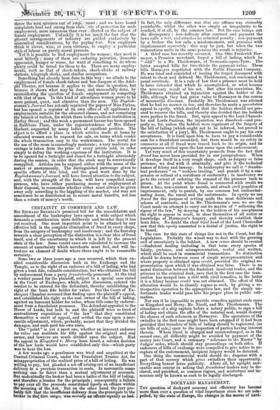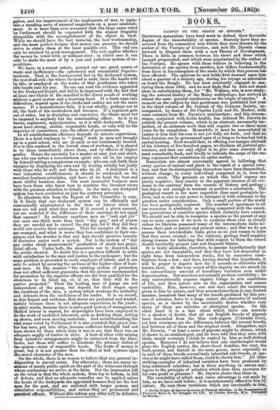DOCKYARD MANAGEMENT.
Tin question of dockyard economy and efficiency has become more than ever a question of vital importance since we are com- pelled, by the state of Europe, the changes in the means of nevi-
gstion, and the improvement of the implements of war, to main- tain a standing navy of unusual magnitude on a peace establish- ment. It is more than ever necessary that the large sums voted by Parliament should be expended with the utmost frugality compatible with the accomplishment of the object in view. While we should have the best material, the best workmanship, and the most perfect designs that money can procure, we should strive to obtain them at the least possible cost. This end can only be attained by good management. The rule applies whether the money be voted with or without stint ; in either case it can only be made the most of by a just and judicious system of ex- penditure.
We have, in a recent article, pointed out one great source of waste and inefficiency—the ephemeral and ornamental Superin- tendents. That is the fundamental fact in the dock_yard system, thee root of all evil; for where the head is unfit, there the hands will. be idle, or employed on the works of that gentleman who takes idle hands into his pay. No one can read the evidence appended to the Dockyard Report, and fail to be impressed with the fact that at least two-thirds of the mischief is the direct result of working. without a good system and a knowing head. If a bank runs into difficulties, depend upon it the clerks and cashier are not the main. causes. If a manufacturer fails, it is not wholly, perhaps not at all, the fault of his overlookers and foremen. If a regiment gets out of order, lax in discipline and expensive, the blame must not be imputed lo anybody but the commanding officer. As it, is in banks, regiments, manufactories, so it is with dockyards. They must have strong, skilful, responsible heads, or vain will.be the inquiries of committees, vain the efforts of governments.
In all establishments efficiency depends on minute supervision. There is a fatal tendency to " scamp" work in men not brought up_ in a good school, who are ill-paid or not handsomely treated. Norio this confined to the lowest class of workmen, it is shared in by those immediately above them, and by officers of higher grades. Hence-the necessity, for a master at once just and strict,. one who can infuse a conscientious spirit into all in. his employ by himself setting a conspicuous example ; who can call forth their energies by displaying his own and by dealing strictly but justly with those who do well and those who de ill. A dockyard is a vast industrial establishment, it should be conducted. on the soundest business principles, and have at its head the best and most skilful business man. The most successful business men. have been those who knew how to combine the broadest views with the greatest attention to details. In the main, our dockyard system has been conducted on just the contrary principles.
To illustrate this from the Report of the Committee is easy. Is it likely that our dockyard system can be efficiently and economically administered in the item of labour when the men are not paid what they earn if it exceed a given amount, yet are mulcted if the difference of their earnings do not equal that amount ? By ordinary exertions men on "task and job" can earn one-third more than their " day pay," and of course they are careful not to exceed the day pay, for if they did they would not receive their earnings. Thus the energies of the men art cramped, and what is worse they lose confidence in their em- ployer, and the wonder is that any men should preserve honesty of character under such a system. Nor is the system of " day pay under cheek measurement" productive of much less preju- dieial effects. Under both, the measurers can be deceived, and the public cheated. No doubt this is a question difficult to settle with satisfaction to the men and justice to the exchequer ; but the same problem is presented to every employer of labour, and it can only be solved by securing the services of the higher dass of busi- ness men. In like manner " the existing system of promotion. does not afford sufficient guarantee that the persons recommended for promotion by the superior officers are the best qualified for the situations to be filled up, or, if so, that they will be the parties promoted." Then the leading men of gangs are not independent of the gang, but depend for their wages upon the exertions of the men, a system, which weakens the authority and detracts from the usefulness of the leader. It is on record, in this Report and evidence, that stores are purloined and wasted, mainly because there is not adequate supervision in the yards ; in other words, because there is not a good system of management. Skilled labour is wasted, for shipwrights have been employed to do the work of unskilled labourers, such as docking ships, setting up shores, and even moving materials. And notwithstanding the vast sums voted by Parliament it is also recorded that green-tim- ber has been put into ships, because sufficient foresight had not been shown by those whose duty it was to see that there was an adequate supply of timber in store. A host of other evils arising. from defective arrangements might be extracted from the blue- books, but these will suffice to illustrate the primary defect of the system—want of responsible heads. The waste of money is great, but it is not greater than the effect of bad systems upon the moral character of the mon.
On the whole, there is no reason to believe that any general in- disposition to amend exists. Far otherwise ; there are many in- stances of manly public spirit on the part of the witnesses through whose confessions we arrive at the facts. But the impression left on the mind is that the whole system, from top to bottom, is full of defects, and that no adequate remedies can be applied unless the heads of the dockyards are appointed because they are the best men for the post, and are endowed with larger powers and correlative responsibilities, and unless they are permanent and practical officers. Without this reform any other will be delusive.



























 Previous page
Previous page